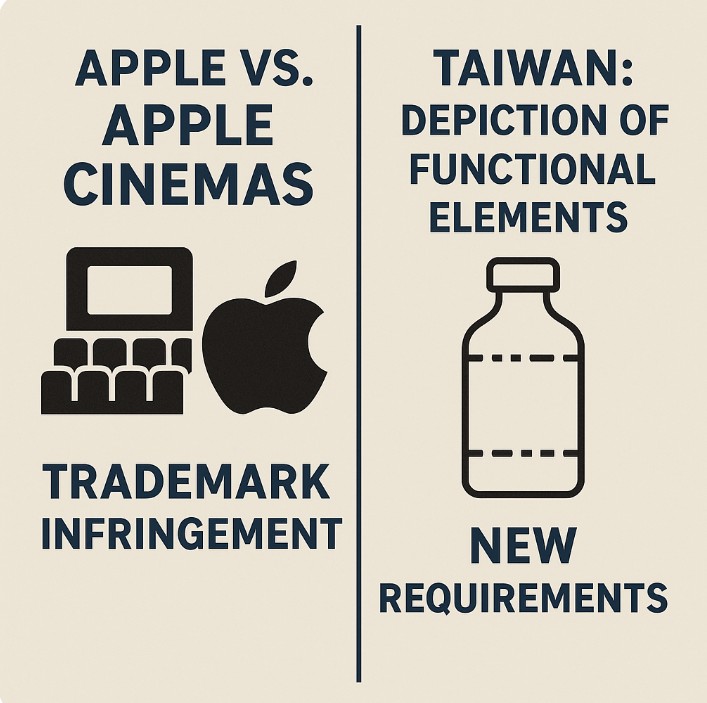Trademark law is in motion. This week brings a pair of headlines with big implications: Apple’s lawsuit against a theater chain, and Taiwan’s revamped rules for how functional elements must appear in trademarks. Here’s what every brand owner should know.
1. Apple Sues Apple Cinemas for Trademark Infringement
- Apple has filed suit against “Apple Cinemas,” a theater chain based in Massachusetts, citing trademark infringement and brand confusion—especially as the chain expands into Silicon Valley.
- The tech company asserts that Apple Cinemas’ use of the name deliberately edges on its well-known brand—despite cease-and-desist efforts and a prior USPTO refusal.
- Apple is seeking both an injunction and damages, aiming to halt further use.
2. Taiwan Updates How Functional Elements Are Depicted in Non-Traditional Trademarks
- As of August 1, 2025, Taiwan requires functional elements in non-traditional trademarks—such as container hooks or grips—to be shown using broken lines. If that’s not possible, applicants must clearly state that these features are not part of the mark.
- For intangible elements like sound or scent, a disclaimer is now mandatory to clarify they are separate from the mark itself.
- This change ensures clarity in examination and reduces disputes over functional design elements in trademarks.
Why You Should Care
- If your brand name overlaps with a well-known mark—even in a different industry—you may face legal challenges. Stand out, or risk standing down.
- Geographic expansion means greater exposure—and greater risk. Make sure your mark is truly distinct and defensible before crossing into new markets.
- For non-traditional marks (like packaging or product design), presentation matters. Consider how your application depicts functional components—visual precision and accurate disclaimers can make or break approval.
Quick Action Plan
- Review your marks in expansion markets—make sure they’re not infringing on established brands.
- Audit your non-traditional mark filings for clarity—update imagery and descriptions as needed.
- Stay informed on global registration trends—rules change, especially with evolving design and branding norms.
In summary: Apple’s courtroom move and Taiwan’s guideline overhaul highlight two truths: you must protect your mark—and show it right.
Nathan Moore is a trademark attorney located in Nashville. Moore Law PC helps individuals and businesses successfully apply for and register trademarks nationwide.



